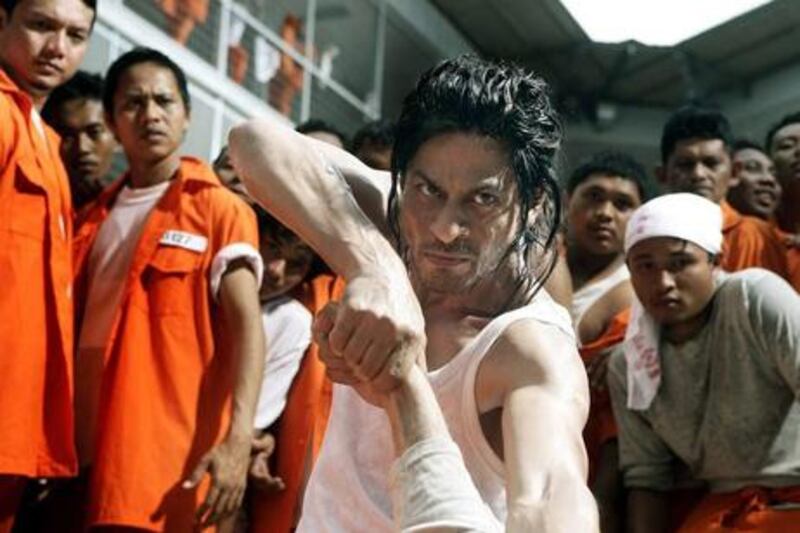The full range and breadth of Indian cinema is on show at the Dubai International Film Festival. Thinking of Indian cinema as just Bollywood action adventures or romances filled with singing and dancing is one of the big myths of film; an increasing number of directors are also operating in a more serious and socially relevant sphere, and these films and more are being showcased as part of DIFF's Celebration of Indian cinema.
Naturally, the films with the big Indian stars at the festival are in the finest traditions of Bollywood. The big highlight is the world premiere tonight of the romantic comedy Ladies vs Ricky Bahl. The fourth film from the director Aditya Chopra (the eldest son of the mega producer Yash Chopra) stars Ranveer Singh (Band Baaja Baaraat) and is loosely inspired by the little-seen 2006 American comedy John Tucker Must Die.
Singh plays the charming rogue Ricky Bahl who takes on different personas to con women out of money. When the three ladies discover that Ricky is a philanderer and love rat, they hatch their own plan of revenge.
Making her movie debut as one of the ladies annoyed by Ricky is Parineeti Chopra, the cousin of the superstar actress and former Miss World Priyanka Chopra. Making it a family affair, the former beauty queen will herself be in attendance at the festival alongside Shah Rukh Khan and the director and actor Farhan Akhtar, who starred in the big hit of the summer Zindagi Na Milegi Dobara and can do no wrong at the moment, whether as actor, director or producer. The trio will be promoting the forthcoming release of Don 2. There will also be a special preview of the much-anticipated sequel at a question-and-answer session hosted by Anuradha Sengupta.
Recently at the Mumbai International Film Festival and the London Indian Film Festival, a big push has been made to celebrate the rich and thriving independent film scene in India. Indeed, there has been a backlash in India about the failure of films outside of the Bollywood system to get international recognition.
One example of this backlash is an article by Jayanth Tadinada in the online magazine Non Resident Indian that claims that while domestic Indian audiences are veering away from Bollywood fare, efforts to support the independent Indian film scene are being undermined by the fact that Indians abroad are watching traditional Bollywood films and paying a high premium to do so. A ticket price in the West is many times the price of entrance in India and films often make their money abroad.
Thankfully, some of the best films showing at DIFF are from the country's independent scene. Srijit Mukherji's 7th August (Baishe Srabon) is a crime thriller that is noteworthy for being Ghutam Ghose's return to acting after a 29-year absence. More famous now as a director, Ghose shows he's lost none of his touch in front of the camera in the story about journalists and police joining forces to catch a serial killer who carries out his murders according to poetry verses from the Hungryalist Movement of the 1960s.
The director Karan Gour's debut Corrode (Kshay) is about a woman's obsession with a statue of the goddess Lakshmi. The film has been compared to Roman Polanski's masterpiece Repulsion. Filmed in black and white, this low-budget fantasy horror features surreal dream sequences and spine-chilling sound effects.
Life Is a Game (Maithanam) received rave reviews in India when it was released, and the first-time director Muthusamy Sakthivel is deserving of all the praise. The Tamil language film is about unrequited love, family honour and friendship. Set in a small suburban town, the film follows four friends and how their relationship changes when love blossoms.
Kaushik Ganguly's Laptop takes its cues from films such as the Italian 1998 film The Red Violin. Like The Red Violin, the story is about a single item - a laptop - that gets passed from one person to another and the story follows the item rather than any one character.
The first film from Shalini Usha Nair, Palas in Bloom (Akam), is making its world premiere. Based on the celebrated Malayalam novel Yakshi by Malayattoor Ramakrishnan, it's about a young architect who starts to suspect that his wife is a demon.
There are also two documentary films from India competing for the Muhr Asia/Africa Award. The Sound of Old Rooms (Kokkho-Poth) by Sandeep Ray had its world premiere at the Pusan Film Festival. Filmed over two decades, the film follows Sarthak, a struggling poet in Kolkata, in a story about literature, domestic life and the end of Communism.
Anand Patwardhan's Jai Bhim Comrade won the Best Documentary Film Award at the Kathmandu documentary film festival. Making light of the 200-minute run-time, the movie, which took 14 years to make, explores the history of Dalit activism in Maharashtra in the aftermath of the killing of 10 Dalit activists in Mumbai in 1997. The action follows the music and tradition of Vilas Ghogre, a leftist poet and singer.
Playing in the short-film section is Safe (Mehfuz) by Rohit Pandey about a city shaken by violence, which sees a mysterious woman roaming the streets.
Rounding off the films from India are screenings of two all-time classics Dil Se (From the Heart) and Lagaan, in recognition of the composer AR Rahman, who is receiving a lifetime achievement award.






